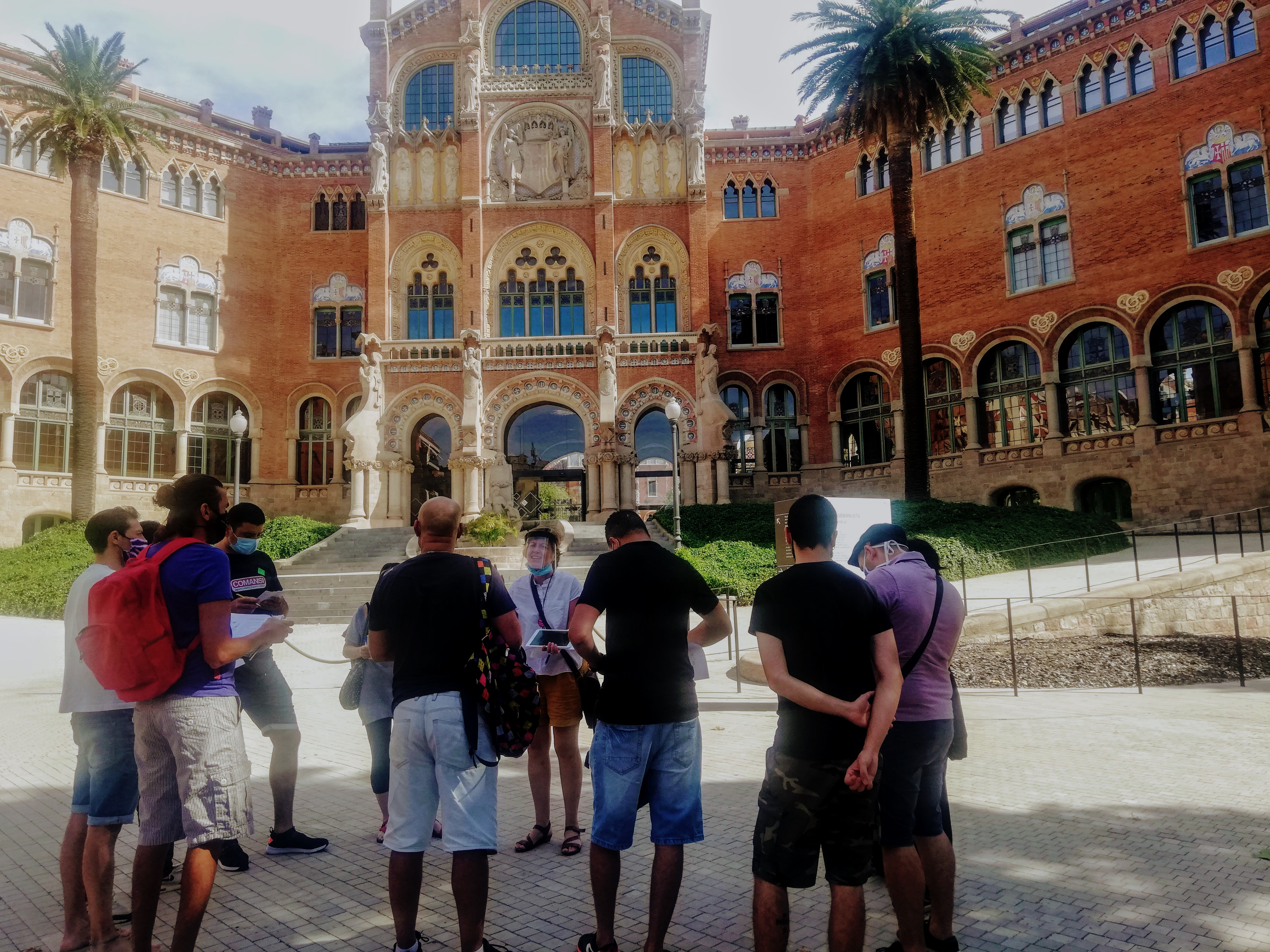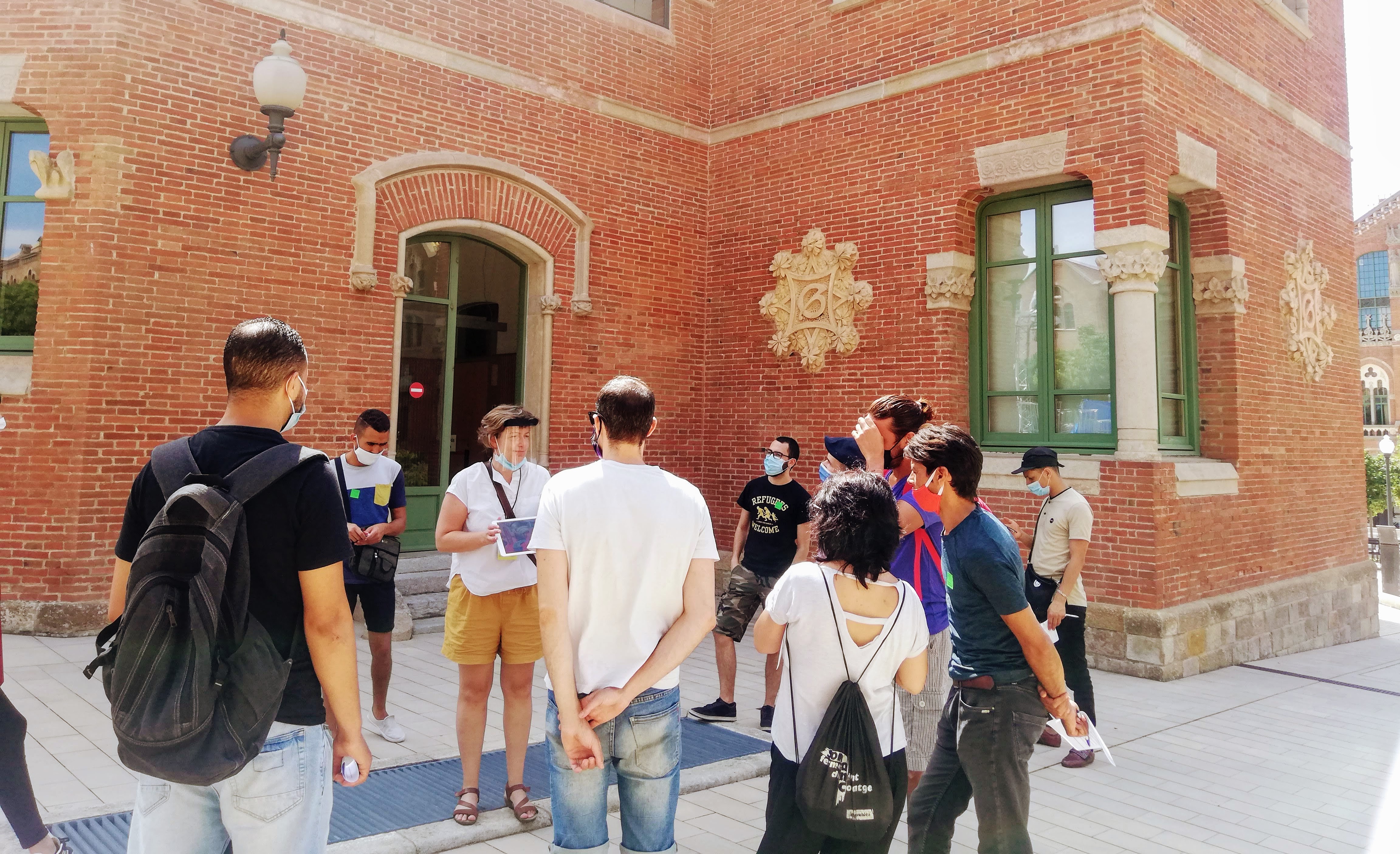04-08-2020
Beyond a sightseeing tour: social inclusion as the objective
Marta Salvador | Alba SudThe Foundation Bayt al-Thaqafa organises, together with a guide from AGUICAT, touristic routes for immigrant people, often excluded from this kind of activities, to know Barcelona. We accompany them during a visit to the Art Nouveau Site of Sant Pau.

Crédito Fotografía: Visita guiada en Sant Pau Recinto Modernista. Fuente: Marta Salvador
Despite the emergency situation of labour precarity and uncertainty about the future of the touristic sector recovery, some activities that have not stopped show how tourism can be used with inclusive finalities. This is the case of the sightseeing tours made through the Foundation Bayt al-Thaqafa. Bayt al-Thaqafa, which means a house where cultures coexist, was founded in 1974 by Teresa Losada, a Franciscan nun and professor of Semitic Philology at the University of Barcelona. With a spirit of helping others, Teresa Losada created the foundation in order to be able to welcome people from Morocco who came to Barcelona in search of a better life. The project, whose patronage is Las Hermanas Franciscanas Misioneras de María and La Orden Hospitalaria de San Juan de Dios, was extended to Sant Vicenç dels Horts, a municipality close to Barcelona, and “today it is a space of trust and security for all”, as explained by Joana Castro, Head of Communication and Fundraising at Bayt al-Thaqafa.
The objective of the foundation is to facilitate social, cultural, civic and political integration of immigrant people, especially those of Arab-Muslim origin, in the society, although nowadays there are 25 different nationalities present. With this aim, interchange and dialogue among cultures are fostered, without giving up the identity of every person. In order to attend all the necessities, Bayt runs different programmes in the following areas: human rights and citizenship; childhood and youth; sociolinguistic reception and work itineraries; culture and languages of origin; temporary residential care; social and legal reception; women; and religious diversity.
From these programmes diverse activities are organized too, many of them are carried out thanks to the almost 200 volunteers that participate. One of these activities, organized from the sociolinguistic program, consists of developing guided visits to different monuments and museums of the city of Barcelona. These visits are performed by Resi Nickl, official guide with a licence granted by the Generalitat de Catalunya and member of the Associació de Guies Habilitats per la Generalitat de Catalunya (AGUICAT). In addition to being a guide for tourists in Barcelona, she decided that she wanted to volunteer: “With the war in Syria, seeing the terrible policies established by my native country, Austria, I decided to do something, even if it was from of Barcelona”. That is how two years ago she got in touch with Bayt al-Thaqafa, from where she was offered to act as a volunteer tour guide, because of her profession. So, once a month Resi makes a cultural visit, thanks also to the heritage sites that facilitate the entrances. This year, these outings have continued after the state of alarm declared due to the COVID-19 pandemic and, in addition, they have mainly integrated Spanish students to be able to link the class contents and learn more applied vocabulary outside the classrooms.

Guided tour in Sant Pau Hospital. Source: Marta Salvador.
As Joana Castro explains, the idea of these visits is that they can get to know the city where they live, to feel it as their own and to have contact with the environment: “Many times the fact that they do not have resources does not allow them to move much and leave their neighbourhood and if, for example, they do not have a metro card, they are scared to be stopped by the authorities because many of them are in an irregular situation”. Resi Nickl also adds that they are usually not familiar with the city if they live in a suburb, due to the high cost of rents in Barcelona and, therefore, they do not visit the centre or other neighbourhoods. So, from Bayt, activities are carried out to encourage meeting and getting to know each other. Resi Nickl also prepares gymkhanas that help students learn and build group cohesion while helping each other: "I thought it would be a competition and then you see that they help each other." In addition, Sara Yagüe, head of the Sociolinguistic Hosting Program, mentions that this is nearly the only place where they can practice Spanish and, therefore, from these visits they show them the need for communication, apart from the cultural learning.
One of the lasts visits was in the Art Nouveau Site Sant Pau, on July 14th, with a group of 13 people (8 students, 2 volunteers, 2 people from the foundation, and the guide). For the majority of students, it was the first time visiting the ancient Sant Pau Hospital and, as Mohamed asserts, apart from the beauty of this monument, he likes these visits because they can get to know each other deeper. Abdeljabar also adds that it is another way of knowing the culture of Catalonia. Moreover, Alessio, volunteer and teacher of the level A1 of Spanish in Bayt, comments that he likes doing these guided tours because the environment is more relaxed and distended than in class where there are a lot of topics: “They learn in a different way, more playful, fun and dynamic. We get to know each other better, leave the teacher-student relationship behind and establish greater camaraderie”. They show this during the visit and especially when filling in the crossword puzzles, with a huge desire to help each other.
Inclusive tourism: a possible reality?
This proposal by Resi Nickl and the Bayt al-Thaqafa Foundation is to use tourism as a mechanism for generating social inclusionwith people who are often at high risk of exclusion. At the same time, it also reflects a profile of tourist guide concerned with the environment in which he works, as shown by Resi, as well as one of her colleagues from AGUICAT who has recently joined as a volunteer for guided tours with Bayt. In addition to all the positive aspects at the community level, these activities also have positive effects on volunteers. As Resi Nickl explains: “I have a lot of fun doing these visits, where I combine my profession with volunteering, because the members of the group are in a good mood, show positivity and are interested in continue learning. They sometimes even show more interest than the tourists themselves. Thanks to these experiences, I value everything I have more and I realize that everything is very relative. Also, I see how people live, with what difficulties, and yet they are grateful. That is why I always leave with good vibes from these visits and I feel more willing to continue doing them".
The spirit of "reaching groups that are not the typical user", which for Resi could be a way of understanding inclusion in tourism, has also been reflected in other actions which have been carried out by AGUICAT. An example is the free visits made each year by various guides of the association to celebrate the Day of the Tourist Guide (February 21st) and to reach various groups or citizens of Barcelona. Specifically, in 2020, they wanted to emphasize some groups living another aspect of the tourism sector, usually with precarious work conditions, such as hotel housekeepers or domestic workers from different associations who were invited to take a guided tour to enjoy tourism from another perspective. On the other hand, it should be mentioned that tour guides have not experienced an easy situation during the health emergency as they have been out of work without generating any income, situation that is still the same for many of them today. Therefore, they have fought to be able to receive state aid. Even on July 1st official guides gathered in front of the Cathedral of Barcelona to vindicate their profession and visualize their problems due to the COVID-19, in a call from the CEFAPIT (Confederation of Associations of State Tourism Guides), with the support of AGUICAT.

Guided tour in Sant Pau Hospital. Source: Marta Salvador.
Therefore, as illustrated in the case of Bayt, there are examples of people and collectives that show their impetus and willingness to change the world and the society we live in. As Joana Castro explains: “what we want from the foundation is to give the necessary tools to these people that today cannot socially participate under the same conditions, so that they can learn the language, a profession, etc., although it is a hard task to carry out if there is no structural change”. In the field of tourism, we can also talk about a structural change if what we want is to approach inclusive tourism in any destination in the world. But, as Ernest Cañada presents, in order to be able to think about the future evolution of tourism, it is necessary to pay attention to the dynamics of tension between exclusion and inclusion in some central aspects that make up the current tourism system. Therefore, it is necessary to go a step further and give rise to experiences such as the one shown in this article, where the use and importance of tourism falls on people and not on capital.

